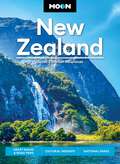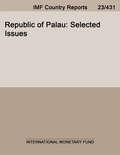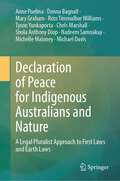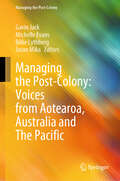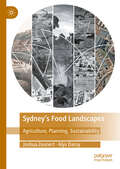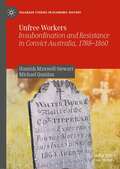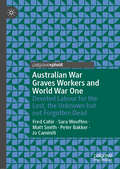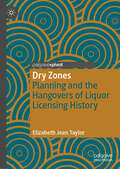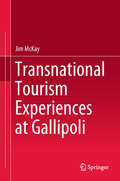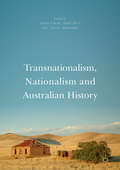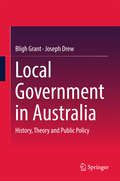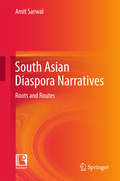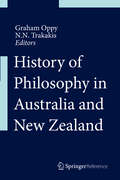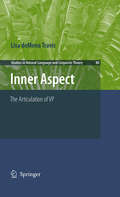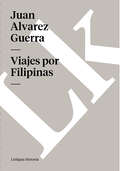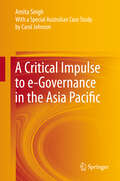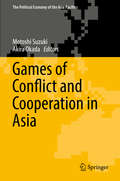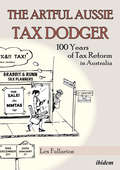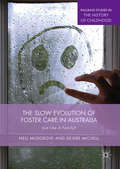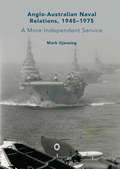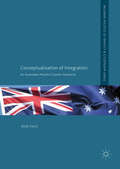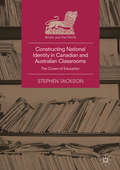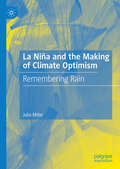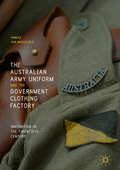- Table View
- List View
Moon New Zealand: Great Walks & Road Trips, Cultural Insights, National Parks (Moon Asia & Pacific Travel Guide)
by Jamie Christian Desplaces Moon Travel GuidesFrom snowy mountains to golden beaches, beauty awaits around every bend on these dramatic islands. Find your adventure with Moon New Zealand. Inside you'll find:Strategic, flexible itineraries, including a trip to experience both the North and South Islands in 16 days The top spots for outdoor adventures, like surfing, mountain biking, and trekking the Great Walks, as well as tips for taking an epic road trip. Go bungee jumping or paragliding, soak in refreshing thermal pools, or embark on a multi-day trek to rugged coasts, glacial valleys, volcanoes, and fjords Can't-miss sights and unique experiences: Cruise the hypnotic black waters of the Milford Sound, spot wild dolphins, kiwis, and blue penguins, and explore the sprawling Waitomo Caves lit by twinkling glowworms. Sample local sauvignon blancs in Marlborough and craft beers in Wellington, or sip cider in the Shire. Learn about Polynesian culture and history, marvel at Māori carvings, and experience a traditional hangi meal How to experience New Zealand like an insider, support local and sustainable businesses, avoid crowds, and respectfully engage with indigenous culture, with expert insight from Auckland local Jamie Christian Desplaces Full-color photos and detailed maps throughout, plus a full-color detachable map Essential background information on the landscape, climate, wildlife, and history, as well as common customs and etiquette Travel tips: When to go, how to get around, and where to stay, plus advice for seniors, families with children, visitors with disabilities, and LGBTQ+ travelers Experience the best of New Zealand with Moon's expert advice and local insight. Visiting more of the South Pacific? Check out Moon Tahiti & French Polynesia.About Moon Travel Guides: Moon was founded in 1973 to empower independent, active, and conscious travel. We prioritize local businesses, outdoor recreation, and traveling strategically and sustainably. Moon Travel Guides are written by local, expert authors with great stories to tell—and they can't wait to share their favorite places with you. For more inspiration, follow @moonguides on social media.
Republic of Palau: Selected Issues (Imf Staff Country Reports #Country Report No. 14/111)
by International Monetary Fund. Asia and Pacific DeptA report from the International Monetary Fund.
Declaration of Peace for Indigenous Australians and Nature: A Legal Pluralist Approach to First Laws and Earth Laws
by Michael Davis Mary Graham Michelle Maloney Tyson Yunkaporta Anne Poelina Donna Bagnall Ross Timmulbar Williams Chels Marshall Shola Anthony Diop Nadeem SamnakayThis groundbreaking book delves into the lived experiences and collective wisdom of Indigenous communities impacted by colonialism. Through collaborations with non-Indigenous colleagues, this book seeks to inform current legal practices and advocate for a transformative shift toward justice, equity, and the recognition of First Law and Earth-centered law.By presenting Indigenous stories as case studies and incorporating the collective wisdom gained through extensive discussions and exchanges with non-Indigenous colleagues, the authors highlight the ways in which Australian law falls short in upholding holistic principles and fails to align with First Law and Earth-centered law. The book invites readers to consider alternative legal futures that are rooted in respect, justice, and the well-being of both Indigenous peoples and the natural environment. Through its thought-provoking analysis, literature reviews, and insights from Indigenous leaders, this book servesas a powerful resource for legal practitioners, policymakers, scholars, and anyone passionate about social justice and environmental sustainability. The book aims to ignite meaningful dialogue and inspire concrete actions to address the historical injustices faced by Indigenous peoples while fostering a more inclusive and equitable legal framework for the generations to come.
Managing the Post-Colony: Voices from Aotearoa, Australia and The Pacific (Managing the Post-Colony)
by Gavin Jack Michelle Evans Billie Lythberg Jason MikaThis edited book is the second in the book series “Managing the Post-Colony”. The book series is co-edited by Nimruji Jammulamadaka (IIM Calcutta, India) and Gavin Jack (Monash University, Australia). The book series seeks to present cutting-edge, critical, interdisciplinary, and geographically and culturally diverse perspectives on the contemporary nature, experience, and theorisation of managing and organising under conditions of postcoloniality. This book specifically presents voices and perspectives from Aotearoa New Zealand, Australia, and The Pacific, locations with shared and distinctive histories and present-day experiences of colonisation and imperialism. Ways of managing, organising, and doing business in these places demonstrate cultural continuity and change in such histories, present sites of postcolonial struggle, and diverse prospects for self-determined future-making. The book explores struggles and prospects of managing in the post-colony through qualitative empirical cases, historical and legal studies, conceptual essays and provocations, and interviews with Indigenous business leaders. It contributes to the ongoing diversification, provincialisation, and decolonisation of management and organisation studies and practice. A strong focus is placed on diverse Indigenous knowledges and experiences, including those of Aboriginal and Torres Strait Islander, Pasifika, and Māori peoples, and insights into the capacity for Indigenous culture-specific modes of business to offer decolonising futures.
Sydney’s Food Landscapes: Agriculture, Planning, Sustainability
by Joshua Zeunert Alys DaroyThe story of Sydney’s metropolitan food landscapes is one of dramatic transformations of First Nations land amidst jostles for power and wealth. This book unearths Sydney's lost commercial agriculture since colonisation in 1788 to assess its fragile food futures. Richly illustrated, 270 images are encapsulated within 110 figures, including an array of original metropolitan-scale mappings. Discussion traverses the city’s diverse cultural influences, from Indigenous land management to British pastoralism, Chinese cultivation of Sydney’s “backyard vegetable garden” and southern European farming spawning billion-dollar empires. The region has further been shaped by a vast array of cultural and ideological factors and material practices, with relevance to planning, policy, ethics, geography, heritage, art, design and technology. This book is the first to bring Sydney’s disparate post-colonial food histories together in one volume to explore the dynamics and tensions between urban growth and food production. The relevance of Sydney’s food landscapes therefore extends far wider than the city itself, with implications for countless regions worldwide in a time of increasing climate and resource precarity.
Unfree Workers: Insubordination and Resistance in Convict Australia, 1788-1860 (Palgrave Studies in Economic History)
by Michael Quinlan Hamish Maxwell-StewartThis book examines how convicts played a key role in the development of capitalism in Australia and how their active resistance shaped both workplace relations and institutions. It highlights the contribution of convicts to worker mobilization and political descent, forcing a rethink of Australia’s foundational story. It is a book that will appeal to an international audience, as well as the many hundreds of thousands of Australians who can trace descent from convicts. It will enable the latter to make sense of the experience of their ancestors, equipping them with the necessary tools to understand convict and court records. It will also provide a valuable undergraduate and postgraduate teaching tool and reference for those studying unfree labour and worker history, social history, colonization and global migration in a digital age.
Australian War Graves Workers and World War One: Devoted Labour for the Lost, the Unknown but not Forgotten Dead
by Matt Smith Fred Cahir Sara Weuffen Peter Bakker Jo CaminitiThis book relays the largely untold story of the approximately 1,100 Australian war graves workers whose job it was to locate, identify exhume and rebury the thousands of Australian soldiers who died in Europe during the First World War. It tells the story of the men of the Australian Graves Detachment and the Australian Graves Service who worked in the period 1919 to 1922 to ensure that grieving families in Australia had a physical grave which they could mourn the loss of their loved ones. By presenting biographical vignettes of eight men who undertook this work, the book examines the mechanics of the commemoration of the Great War and extends our understanding of the individual toll this onerous task took on the workers themselves.
Dry Zones: Planning and the Hangovers of Liquor Licensing History
by Elizabeth Jean TaylorThis book tells the story of local-level controls on liquor licensing (‘local option’) that emerged during the anti-alcohol temperance movement of the late 19th and early 20th centuries. It offers a new perspective on these often-overlooked smaller prohibitions, arguing local option not only reshaped the hotel industry but has legacies for, and parallels with, questions facing cities and planners today. These range from idiosyncratic dry areas; to intrinsic ideas of residential amenity and neighbourhood, zoning separation, and objection rights. The book is based on a case study of temperance-era liquor licensing changes in Victoria, their convergence with early planning, and their continuities. Examples are given of contemporary Australian planning debates with historical roots in the temperance era – live music venues, bottle shops, gaming machines, fast food restaurants. Dry Zones uses new archival research and maps; and includes examples from family histories in Harcourt and Barkers Creek, a district with a temperance reputation and which closed all its hotels during the temperance era. Suggesting ‘wowsers’ are not so easily relegated to history books, Taylor reflects on tensions around individual and local rights, localism and centralism, direct democracy, and domestic violence, that continue to be re-enacted. Dry Zones visits a forgotten by-way of licensing history, showing the early 21st century is a useful time to reflect on this history as while some temperance-era controls are being scaled back, similar controls are being put forward for much the same reasons.
Transnational Tourism Experiences at Gallipoli
by Jim McKayThis book offers a fresh account of the Anzac myth and the bittersweet emotional experience of Gallipoli tourists. Challenging the straightforward view of the Anzac obsession as a kind of nationalistic military Halloween, it shows how transnational developments in tourism and commemoration have created the conditions for a complex, dissonant emotional experience of sadness, humility, anger, pride and empathy among Anzac tourists. Drawing on the in-depth testimonies of travellers from Australia and New Zealand, McKay shines a new and more complex light on the history and cultural politics of the Anzac myth. As well as making a ground breaking, empirically-based intervention into the culture wars, this book offers new insights into the global memory boom and transnational developments in backpacker tourism, sports tourism and “dark” or “dissonant” tourism.
Transnationalism, Nationalism and Australian History
by Alecia Simmonds Anna Clark Anne ReesUsing Australian history as a case study, this collection explores the ways national identities still resonate in historical scholarship and reexamines key moments in Australian history through a transnational lens, raising important questions about the unique context of Australia's national narrative. The book examines the tension between national and transnational perspectives, attempting to internationalize the often parochial nation-based narratives that characterize national history. Moving from the local and personal to the global, encompassing comparative and international research and drawing on the experiences of researchers working across nations and communities, this collection brings together diverging national and transnational approaches and asks several critical research questions: What is transnational history? How do new transnational readings of the past challenge conventional national narratives and approaches? What are implications of transnational and international approaches on Australian history? What possibilities do they bring to the discipline? What are their limitations? And finally, how do we understand the nation in this transnational moment?
Local Government in Australia
by Bligh Grant Joseph DrewThis book offers a general introduction to and analysis of the history, theory and public policy of Australian local government systems. Conceived in an international comparative context and primarily from within the discipline of political studies, it also incorporates elements of economics and public administration. Existing research tends to conceptualise Australian local government as an element of public policy grounded in an 'administrative science' approach. A feature of this approach is that generally normative considerations form only a latent element of the discussions, which is invariably anchored in debates about institutional design rather than the normative defensibility of local government. The book addresses this point by providing an account of the terrain of theoretical debate alongside salient themes in public policy.
South Asian Diaspora Narratives
by Amit SarwalSome happy occasions, like the 1995 Commonwealth Writers' Prize for Best Book to Bangladeshi-Australian author Adib Khan, the 2008 Man Booker Prize to Indian born Australian writer Arvinda Adiga, and the 2013 Australian Prime Minister's Literary Award for Fiction to Sri Lankan-Australian author Michele de Krester, have boosted the self-confidence of South Asian-Australian writers in Australia. South Asian diasporic communities have also been the focus for relatively small, but constantly growing, studies by anthropologists and sociologists on the interrelation of gender, race, ethnicity and migration in Australia. The terms "Labels" and "Locations" capture numerous aspects that contribute in the making of a diasporic consciousness. This book critically examines the issues of identity, gender, family, class and caste, expressed in the short narratives of South Asian diaspora writers based in Australia. Taking an interdisciplinary approach--from literary, cultural, historical, anthropological, and sociological studies--this book engages chiefly with the oeuvre of postcolonial writers and academics, namely: Mena Abdullah, Adib Khan, Yasmine Gooneratne, Michelle De Kretser, Chandani Lokuge, Chitra Fernando, Satendra Nandan, Suneeta Peres da Costa, Hanifa Deen, Christopher Cyrill, Suvendrini Perera, Sunil Govinnage, Brij V. Lal, Sunil Badami, Glenn D'Cruz, Chris Raja, Manik Datar, David De Vos, Rashmere Bhatti, Kirpal Singh Chauli, Sujhatha Fernandes, Neelam Maharaj, Sushie Narayan, Madu Pasipanodya, Shrishti Sharma, Beryl T. Mitchell, and Sunitha. This book will, by calling upon the works of this much-neglected South Asian diaspora group, fill a lacuna in the broader critical rubric of diaspora studies.
History of Philosophy in Australia and New Zealand
by Graham Oppy N. N. TrakakisThe History of Philosophy in Australia and New Zealand is a comprehensive account of the historical development of philosophy in Australia and New Zealand, from the establishment of the first Philosophy Chair in Australasia in 1886 at the University of Melbourne to the current burgeoning of Australasian philosophy. The work is divided into two broad sections, the first providing an account of significant developments and events during various periods in the history of Australasian philosophy, and the second focusing on ideas and theories that have been influential in various disciplines within Australasian philosophy. The work consists of chapters contributed by various philosophers, on specific fields of inquiry or historical periods within Australasian philosophy.
Inner Aspect
by Lisa Demena TravisThis monograph probes the structure of the verb phrase through a cross-linguistic investigation of the syntax and morphology of relevant constructions. Evidence is provided for two event-related non-lexical projections called "inner aspect" and "event".
Viajes por Filipinas
by Juan Álvarez GuerraThis book was written in 1871 by order of the Governor General of the Philippines, Rafael Izquierdo. The work includes relevant ethnographic, geographic, historical, and political data.
Dream. Unidos por el destino
by Sarah LarkDream. Unidos por el destino, es la segunda novela juvenil de la autora best seller Sarah Lark. Magníficamente escrita, invita al lector a disfrutar de una mágica historia el amor y la libertad. Sarah se muda con sus padres a Nueva Zelanda. A pesar de los paisajes de ensueño, Sarah no puede evitar echar de menos su antiguo hogar en Alemania, las cuadras y, sobre todo, al caballo del que se ocupaba allí. Empieza a interesarse por su nuevo hogar cuando, junto al atractivo y misterioso Lucas, descubre los caballos salvajes del monte Kaimanawa. Sarah se prenda de un semental plateado al que bautiza en secreto como Dream. Cuando Sarah se entera de que los caballos van a ser apresados y domados para hacer sitio al ejército, que necesita construir un campo de maniobras, Sarah está en shock. Para colmo, Dream acaba en manos de un brutal tratante de caballos y Sarah no puede evitar obsesionarse con una idea: ¿Cómo puede devolverle la libertad a Dream?
A Critical Impulse to e-Governance in the Asia Pacific
by Amita SinghThis book presents a comparative study of the vision, ability and dynamism on the part of governments in selected Asian Pacific countries as they engage in the distribution of e-governance. Consequently, it creates a platform for mutual learning and offers a dispassionate evaluation of mega e-projects. It is an interdisciplinary study of information and communication technology within mainstream social science research and attempts to bridge the gap in empirical research between the nature of technology and the manner in which it is governed. The analysis shows that hegemonic and panoptic structures of surveillance and control may derail efforts to establish sustainable e-governance, while a liberal futuristic framework with open socio-technology networks on Big Data analytics, IPv6 and Cloud Computing may strengthen the trend towards democratizing institutions. Further, the book highlights the extraordinary energy being generated in the emerging new world through their use of the internet and suggests how governments could translate this into a new wealth of economic opportunities, social inclusion and equitable development, in addition to achieving the MDGs (Millenium Development Goals). Lastly, it emphasizes the importance of a visionary approach, which, wherever present, has been able to sustain e-governance by meaningfully linking the micro to the macro and heritage to the horizon.
Games of Conflict and Cooperation in Asia
by Motoshi Suzuki Akira OkadaThis edited volume is an outcome of the first major collaborative project between Japanese economists and political scientists, funded by the Japan Society for the Promotion of Science. The authors of the individual chapters show that Asian states play games of conflict and cooperation strategically by creating, changing, or destroying institutions. For them, conflict and cooperation are inseparable phenomena and are integral parts of states' strategic interactions under constraints. Through the establishment of appropriate institutions that coordinate states' actions, present conflict can be turned into stable cooperation in the future. No discernible difference exists in the extent of rationality between the East and the West, but substantial variations between regions or even within a region are found in institutions that are influenced by history and culture. Historical and cultural variations divide contemporary Asia, making regional institutional cooperation difficult and prompting some Asian states to use global or inter-regional arrangements in order to obtain benefits of cooperation. Qualifications are provided for this line of argument in the first chapter, which also discusses the affinity of international relations theory and game theory, with special attention to Japan and Asia. The following ten substantive chapters are developed based on the conceptual framework and, for integrity and coherence, are sub-grouped into four parts that correspond to major issues in international relations scholarship: (1) conflict management, (2) arms control, (3) trade, and (4) currency.
The Artful Aussie Tax Dodger: 100 Years of Tax Reform in Australia
by Lex FullartonIn The Artful Aussie Tax Dodger, Lex Fullarton studies the impact of 100 years of taxation legislation in Australia, from 1915 to 2016. He finds that despite the lessons of a century of taxpayers and administrators' actions and reactions, old habits are hard to break. Driven by the winds of various political and social interests, Australia embarked on a century of tax reform from the moment when its first Income Tax Assessment Act was introduced. <P><P>Fullarton discusses the oldest of tax planning entities, the British Trust, the introduction of Australia's 'reformed' consumption tax, its VAT, referred to as Goods and Services Tax, an analysis of tax avoidance schemes, and finally government taxation reform. This book looks at how Australia's tax legislation was grounded, added to, avoided, and evolved, until it went 'Back to the Future'. It is a collection of studies compiled from experience and research conducted over twenty years of involvement in taxation law in rural and remote Australia.
The Slow Evolution of Foster Care in Australia: Just Like A Family? (Palgrave Studies in the History of Childhood)
by Nell Musgrove Deidre MichellThis book draws on archival, oral history and public policy sources to tell a history of foster care in Australia from the nineteenth century to the present day. It is, primarily, a social history which places the voices of people directly touched by foster care at the centre of the story, but also within the wider social and political debates which have shaped foster care across more than a century. The book confronts foster care’s difficult past—death and abuse of foster children, family separation, and a general public apathy towards these issues—but it also acknowledges the resilience of people who have survived a childhood in foster care, and the challenges faced by those who have worked hard to provide good foster homes and to make child welfare systems better. These are themes which the book examines from an Australian perspective, but which often resonate with foster care globally.
Anglo-Australian Naval Relations, 1945–1975: A More Independent Service
by Mark GjessingThis book examines Anglo-Australian naval relations between 1945-75, a period of great change for both Australia and Great Britain and their respective navies. It explores the cultural and historical ties between the Royal Navy and the Royal Australian Navy (RAN), the efficacy of communications between the services, and the importance of personal relations to the overall inter-service relationship. The author assesses the dilemmas faced by Great Britain associated with that nation’s declining power, and the impact of the retreat from ‘East of Suez’ on the strategic relationship between the United Kingdom and Australia. The book also considers operational co-operation between the Royal Navy and the RAN including conflicts such as the Korean War, the Malayan Emergency, and confrontation with Indonesia, as well as peacetime pursuits such as port visits and the testing of atomic weapons in the 1950s. Co-operation in matters of personnel and training are also dealt with in great detail, along with the co-operation between the Royal Navy and the RAN in equipment procurement and design and the increased ability of the RAN to look to non-British sources for equipment procurement. The book considers the impact of stronger Australian-American ties on the RAN and appraises the role it played in the conflict in Vietnam.
Conceptualisation of Integration: An Australian Muslim Counter-Narrative (Palgrave Politics Of Identity And Citizenship)
by Abdi HersiThis book identifies and examines the meanings of integration from the perspective of Australian Muslims, through analysis of focus group discussions and in-depth interviews in the South East Queensland region. It provides a comprehensive overview of Muslim conceptualisation of integration, and the author explores the various meanings Muslims ascribe to it, such as participation, belonging and contributing to the wider societyBy gaining an understanding of how Muslims define integration, this research can help policy makers, academics and settlement service providers to appreciate how culture and faith influence the meanings diverse groups give to certain accepted terms. It will be of interest to scholars and students in the fields of migration, mobility, integration and social cohesion.
Constructing National Identity in Canadian and Australian Classrooms: The Crown of Education (Britain and the World)
by Stephen JacksonThis book explores the evolution of Canadian and Australian national identities in the era of decolonization by evaluating educational policies in Ontario, Canada, and Victoria, Australia. Drawing on sources such as textbooks and curricula, the book argues that Britishness, a sense of imperial citizenship connecting white Anglo-Saxons across the British Empire, continued to be a crucial marker of national identity in both Australia and Canada until the late 1960s and early 1970s, when educators in Ontario and Victoria abandoned Britishness in favor of multiculturalism. Chapters explore how textbooks portrayed imperialism, the close relationship between religious education and Britishness, and efforts to end assimilationist Anglocentrism and promote equality in education. The book contributes to British World scholarship by demonstrating how decolonization precipitated a massive search for identity in Ontario and Victoria that continues to challenge educators and policy-makers today.
La Niña and the Making of Climate Optimism: Remembering Rain
by Julia MillerThis book examines the deep connection Australians have with their climate to understand contemporary views on human-induced climate change. It is the first study of the Australian relationship with La Niña and it explains how fundamental this relationship is to the climate change debate both locally and globally. While unease with the Australian environment was a hallmark of early settler relations with a new continent, this book argues that the climate itself quickly became a source of hope and linked to progress. Once observed, weather patterns coalesced into recognizable cycles of wet and dry years and Australians adopted a belief in the certainty of good seasons. It was this optimistic response to climate linked to La Niña that laid the groundwork for this relationship with the Australian environment. This book will appeal to scholars and students of the environmental humanities, history and science as well as anyone concerned about climate change.
The Australian Army Uniform and the Government Clothing Factory: Innovation In The Twentieth Century
by Anneke Van MosseveldThis book reveals the business history of the Australian Government Clothing Factory as it introduced innovative changes in the production and design of the Australian Army uniform during the twentieth century. While adopting a Schumpeterian interpretation of the concept of innovation, Anneke van Mosseveld traces the driving forces behind innovation and delivers a comprehensive explanation of the resulting changes in the combat uniform. Using an array of archival sources, this book displays details of extensive collaborations between the factory, the Army and scientists in the development of camouflage patterns and military textiles. It uncovers a system of intellectual property management to protect the designs of the uniform, and delivers new insights into the wider economic influences and industry linkages of the Government owned factory.
